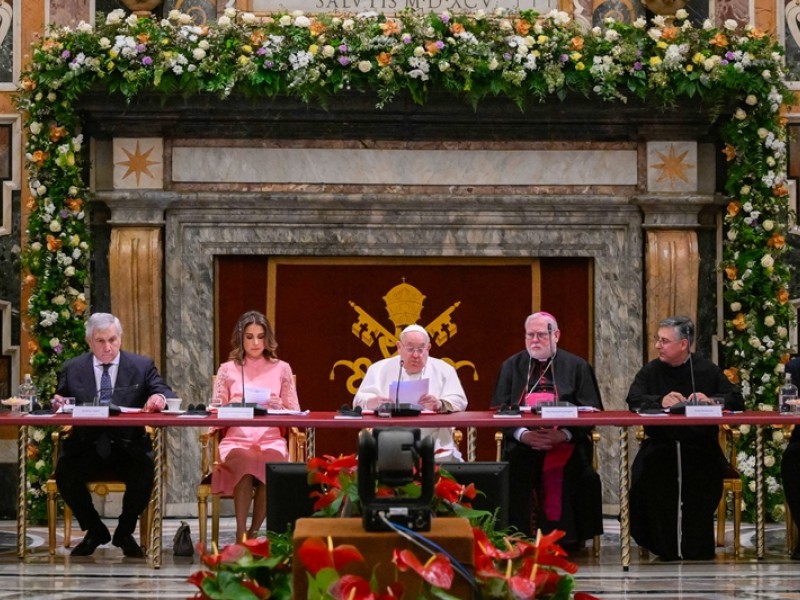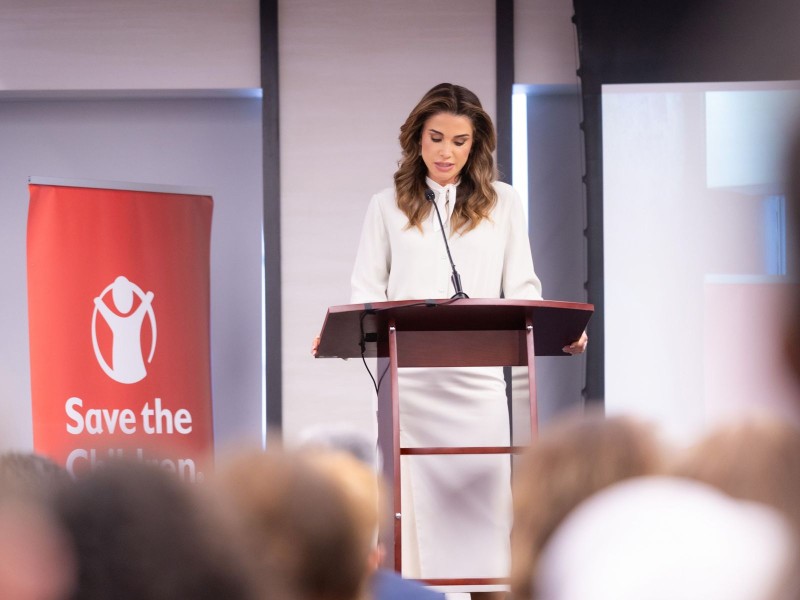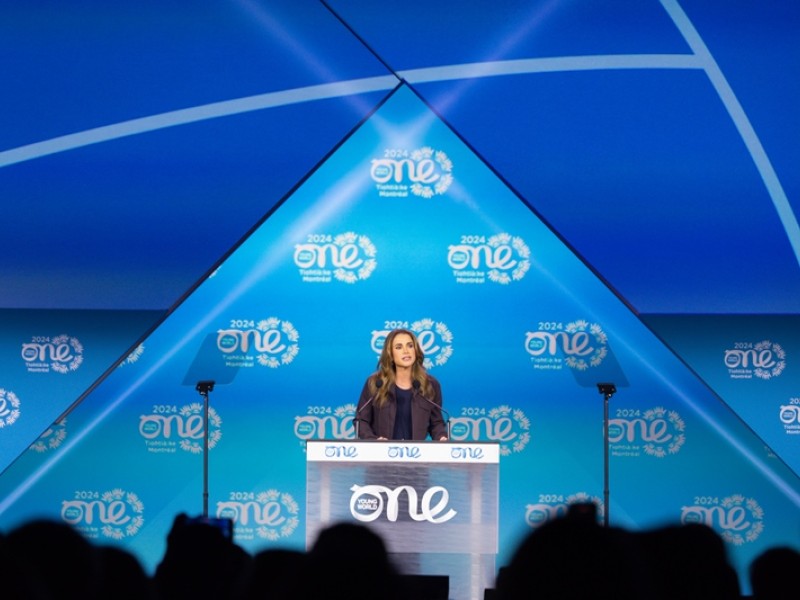Queen Rania’s Speech at the CogX Global Leadership Summit - London, UK
The playwright Eugène Ionesco once observed, “It’s not the answer that enlightens but the question.”
I love that quote. And it sums up why I’ve been so keen to join you here at CogX. Because the question: “How do we get the next 10 years right?” is spot on. It acknowledges that the future will be what we make it.
Sounds a bit obvious – even a bit cliché!
But in an age where we carry a world of information in our pockets… where GPS keeps us from ever getting lost… where AI churns out content and code… and where we’re connected to everything, everywhere, all at once… it is incredibly tempting to start taking progress for granted, as if continuous improvement is a law of nature, and we’re just along for the ride.
And it’s easy to lose our focus. To be dazzled by treatments that promise to help us live forever, while every day, about 14,000 children under five are dying of preventable causes… fascinated by CEOs squaring to fight, while millions in poverty fight to survive… captivated by rockets taking tourists to space, while the planet we call home is burning and drowning all at once.
Meanwhile, our common challenges grow and spread, until everywhere we turn, they’re at our doorstep: Another conflict. Another city on fire. Another deadly virus. Rising inequality. Plummeting trust. Half the world’s population at risk of mental health disorders.
Even our greatest technological advances seem potentially catastrophic, with some of the people who gave birth to AI now warning that it could end us all.
It’s no wonder that the world feels somehow off-balance – like things have gone terribly wrong, terribly fast. But, the truth is, we have gotten lots of things right. Development data shows it—on issues from health to wealth, education, and freedoms.
But here’s another equally critical truth: progress is not inevitable. It is not automatic. We are the ones who chart the course and hold the wheel. But I don’t think enough people realize that every decision we make or don’t make today will define where we end up tomorrow. Acting as if the future depends on us isn’t optional; it’s a must.
And we have what it takes. We already have many of the solutions, and the ability to marry human and artificial intelligence – responsibly, I hope – to come up with those we don’t.
So, what’s missing isn’t technology or talent: It’s political will that’s in short supply. And no application can create that for us – unless someone here has cracked it, in which case, we can all breathe a sigh of relief and just go home! If not, then we need a new approach to human leadership.
Today, I’d like to suggest three ways we can flip the leadership script.
I have been in this job for almost 25 years. Although, to be fair, the turnover for the position of “queen” is typically quite low.
I have met countless leaders. Sat with the most influential and the most powerless of people. My job has taken me from global forums like this one… to desolate camps at the fringes of society, overcrowded with refugees whose suffering has been so unspeakable that they literally cannot find the words.
It has been there—in traveling to the margins, in drawing near to those whose lives have been turned upside down—that my perspective on leadership has shifted.
Because, in refugee camps from Jordan to Greece to Bangladesh, I’ve met people with nothing who still manage to share everything. People brutalized by a selfish world, who still put others’ lives before their own.
Through my work, my view of leadership hasn’t just shifted—it’s inverted. If the world’s most powerless can act with such strength, what does that say about the rest of us?
I used to think the strongest leaders were the ones with the firmest convictions. Now, I believe that inviting doubt is how we test the strength of our convictions.
I used to think effective leaders guided from the front. Now, I believe that our capacity to lead is only as effective as our willingness to follow.
I used to think the wisest leaders leaned heavily on logic… when, really, our power lies both here [points to head]… and here [points to heart].
Let’s start with doubt.
To get the next 10 years right, I’m afraid we’re all going to have to get a lot more comfortable being wrong.
Just saying it is uncomfortable! I am a mom after all, I am always right… even when I am wrong! But one of the greatest risks we face today is indulging in unchecked certainty.
Conventional wisdom says doubt is weak, but a false sense of security is even worse. The rage infecting our public discourse is certitude on steroids! Aggressive, chest-thumping, posturing zeal that substitutes stubbornness for reflection.
When we can’t tolerate ideas that challenge our own, we hold their proponents in contempt. We retreat into bunkers of “us vs. them,” putting ever-greater distance between us, and making problem-solving practically impossible.
This year, in a survey of 27 nations, six in 10 people said their country’s social fabric has grown too weak to serve as a foundation for unity. Even more said that the lack of civility and mutual respect today is the worst they’ve ever seen.
And yet, as humans, we cling to certainty as a shield against vulnerability. When our world goes haywire, we’d rather cast blame than acknowledge that we might have missed the mark.
You might remember, in June, an overcrowded fishing boat sank in the Mediterranean—an all too familiar disaster. More than 600 passengers died. Not a single woman or child survived. They were migrants who’d left their homelands to seek a better life in Europe— a journey that turned out to be their last.
Almost immediately, opposing factions staked out their positions.
On one side, they argued that Europe’s tough migration policies had led authorities to delay rescue. On the other, they insisted it was Europe’s leniency that led migrants to risk their lives in the first place.
Each side saw the sunken boat as proof of their version of truth. Each evaluated evidence in a way that confirmed their own convictions. Psychologists call this “myside bias.” And all of us are prone.
“Myside” thinking makes it easy to point fingers and feel righteous. To conclude that the other side is foolish, heartless, with no rational explanation for their stance. But “myside” thinking isn’t just an offensive play… it’s also a defensive maneuver against the horror we would otherwise bear together.
Because if we let down our shield of certainty, we would have to confront painful questions, like: How could we have let this happen? How could we have stood by and watched? Are we really so stuck in our bunkers of belief that we could not act to save a drowning child?
You may think certainty is a mark of moral integrity. But is it?
Because certainty can lead to moral fracture—a code of ethics that registers a sinking ship first as evidence of being right, and only second as tragedy.
When we let our convictions divide the world into camps, we fight each other instead of fighting our problems… and we miss the opportunity to cultivate common ground.
On the matter of migration, we could flip the script from problem to possibility. After all, in many developed countries, more jobs exist than can be filled. One estimate suggests that by 2050, the UK and Europe will face a gap of 44 million workers.
If we abandoned zero-sum thinking, we could generate mutual benefit by creating programs that match vacant jobs with willing labor. But in order to see a clear way forward, we must open ourselves to doubt.
The next ingredient for a new kind of leadership is learning how to follow.
And I’m definitely not talking about “likes” and retweets on social media! I’m talking about the kind of followership that has fueled the world’s great social movements: The first women who showed up to suffrage meetings, the Black workers who boycotted the bus, the South Africans who refused to carry the pass books of apartheid.
I’m talking about the people who stood in the hall when there were no more seats in the room. The ones who joined their voices and spread the word, until the chorus was too loud to ignore.
I don’t need to tell any of you that, today, we face an existential challenge that demands a global movement.
Scientists say that if we surpass 1.5 degrees of warming, climate disasters will become so catastrophic that humans will not be able to adapt. Right now, we’re on a trajectory to exceed that level by the early 2030s.
And make no mistake: We will need effective leaders to avoid disaster. But political change will only happen with the active participation of the public. And scholars suggest the tipping point for successful movements is 3.5 percent of a population.
Imagine how much we could achieve if people like you—respected leaders of startups, think tanks, and teams—helped champion the role that each of us can play not only as a leader but as a follower: Part of the 3.5 percent who accelerate the movement from behind.
To borrow the words of environmentalist Bill McKibben, if you consider “the scale of the problem that we face, really, the most important thing an individual can do is be somewhat less of an individual.”
If we can do that… If we can see ourselves as part of something bigger… I believe we can bend the arc of history below 1.5 degrees.
The last ingredient for a new kind of leadership means embracing the logic of empathy.
Getting things right means doing the right thing. And for that, we must think with our hearts.
In 2011, as many of you will recall, civil war broke out in Syria. Within months, hundreds of thousands of Syrians were seeking refuge in Jordan. My husband, His Majesty King Abdullah, had a tough decision to make: Would we open Jordan’s borders?
There were so many variables to consider, from our limited resources to unemployment, social stability, providing schooling and health care, and more. And it’s tempting to guess what an algorithm would have done with that information.
But His Majesty knew what mattered most. His heart led his actions. As he put it, “There is a hungry child and a desperate mother at our border. How could we not let them in?”
Today, one in eight people in my country is a Syrian refugee. I could not be prouder of the generosity my countrymen and women have shown.
And, as we speak, people in Chad and other African nations are taking in refugees from Sudan. Despite their own struggles and strained resources, they too are doing the right thing.
But the number of forcibly displaced people topped 110 million last year. And those of us whose countries are neighbors to conflict cannot shoulder “the right thing” for everyone.
Since July, the World Food Program has been cutting support for Syrian refugees in Jordan—not because the need has passed, but because new emergencies are breaking out, while donor support has lagged.
Seventy-four percent of the world’s displaced are hosted by low- and middle-income countries… while some wealthier nations erect fences and walls, both physical and metaphorical—with some portraying asylum-seekers as invaders.
And I cannot help but note the contrast in compassion for refugees who fled Ukraine versus those leaving Sudan. Four months into the war in Sudan, less than 30 percent of donor appeals had been met, while the Ukraine emergency appeal was 70 percent funded within its first month.
I don’t think we need a supercomputer to explain such discrimination.
When we demonize people for seeking a better life for their families, we normalize their suffering. We normalize 11 children on average drowning each week in dangerous Mediterranean crossings. We normalize people going hungry in a world of plenty—not because we cannot help them, but because we’ve chosen not to.
So, perhaps another compelling question for this gathering is: What good is artificial intelligence if we cannot summon authentic empathy with it?
That’s why, to get the next 10 years right, we should do the right thing right now. I still believe it is how we behave as humans that makes all the difference.
I still believe it is our compassion for one another, our willingness to stand for something larger than ourselves, and our recognition that we all deserve dignity that will fuel the progress we seek.
To assess our health, we must consider our care for the sick. To measure our strength, we must evaluate our defense of the oppressed. To set our target, we must look to the margins. To stay on track, we must ensure that no one is trailing behind.
Our challenges are complex—but I know this audience isn’t one to shrink from complexity. In asking one another how we can get the next 10 years right, our premise at CogX is that we can.
Every day, brilliant people like you work to break new barriers and to do what’s never been done before.
If we judge our conviction by our capacity to doubt… leadership by our willingness to follow… and our decisions by whether they are informed by mind and heart … we can face the future arm-in-arm, with energy, optimism, and hope.
We can make the next 10 years the greatest era of progress humanity has ever known.
And every year after that.
Thank you.
Featured
Queen Rania's official website
This website does not support old browsers. To view this website, Please upgrade your browser to IE 9 or greater
Your browser is out of date. It has known security flaws and may not display all features of this and other websites. Learn how to update your browser



